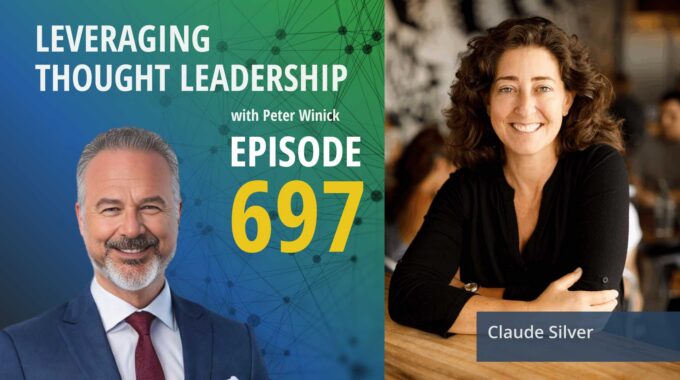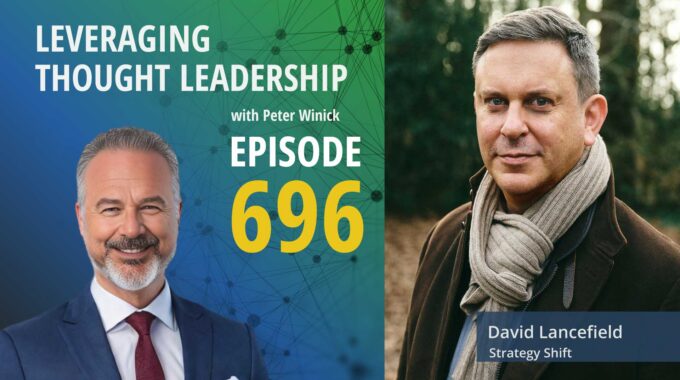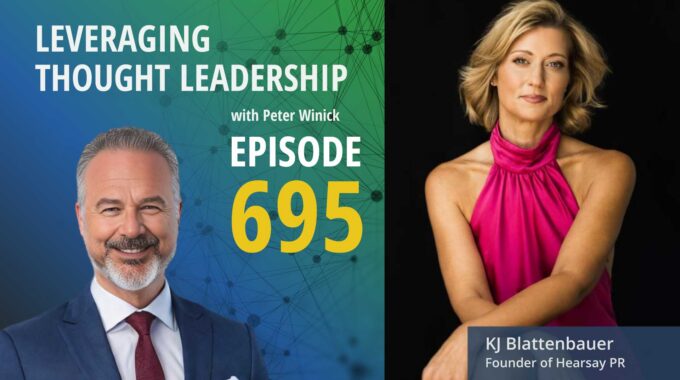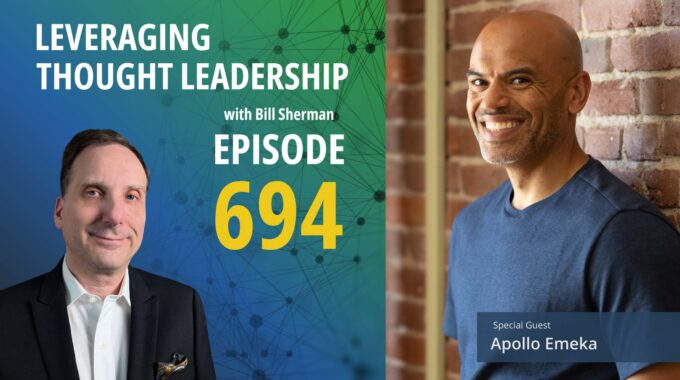Frameworks for connection, accountability, and performance This episode examines how psychological safety drives performance, how…
Thought Leaders as Podcast Guests | Jessica Rhodes
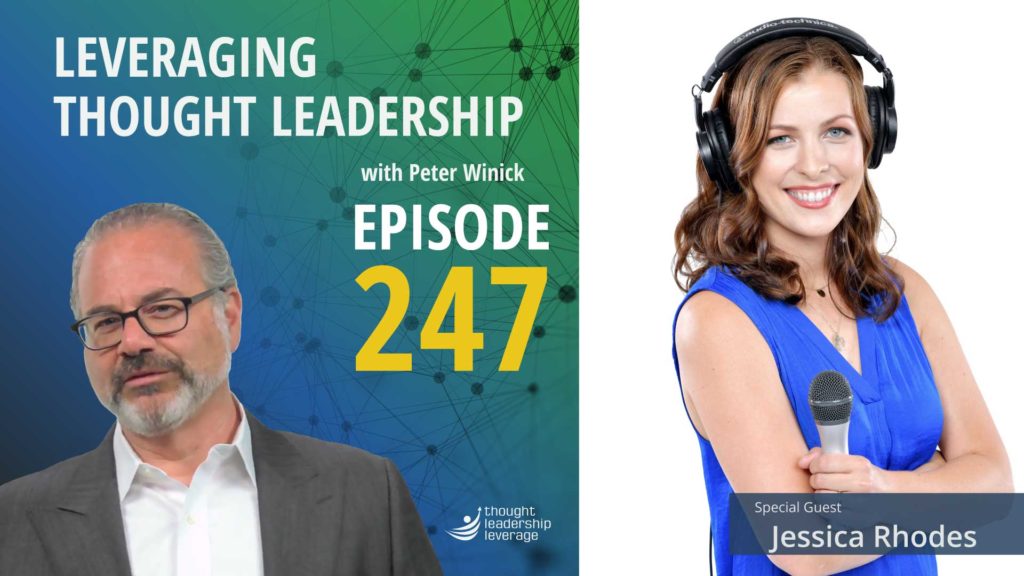
Maximizing your podcast appearances.
An interview with Jessica Rhodes on how thought leaders can get the most out of being a guest on podcasts.
Today’s guest is Jessica Rhodes the leading expert on how to leverage podcast guesting for increased brand awareness, generation of more leads, and how to gain higher profits. She created the podcast booking industry in 2013 when she founded Interview Connections, the first and leading agency of its kind. Plus, she is the host of Rock the Podcast, a podcast where you will learn all about podcast guesting and how to leverage podcast interviews to grow your brand awareness.
Jessica shares the benefits of committing long term to be a podcast guest and why trying it short term will not have the desired effect. We discuss finding the podcasts that are right for you, narrowing your audience, and perhaps most importantly having systems in place to leverage your episodes after they go live.
This is an incredible episode packed with a ton of great advice for anyone looking to increase their positioning by being a guest on podcasts. So listen in as we talk about thought leadership strategy, podcasts, and where the podcast industry is headed!
Three Key Takeaways from the Interview:
- The length of time thought leaders need to commit to being involved in the podcast guest circuit.
- Why thought leaders need to be specific about the type of podcast they appear on.
- How being a guest as a thought leader can be more than an interview and why you need to take the opportunity to build a relationship.
If you’re trying to write or publish a book and need help with various aspects of the process, contact Thought Leadership Leverage. Also, we can help you understand the rewards and costs of publishing thought leadership as well as devise a strategy to get your book published and into the hands of the right people.
Transcript:
Peter Welcome, welcome, welcome. This is Peter Winick. I’m the founder and CEO of Thought Leadership Leverage and you’re joining us on the podcast today, which is Leveraging Thought Leadership. I’m excited about today’s episode. My guest today is Jessica Rhodes, who’s the founder and co-owner of Interview Connection. Jessica is the leading expert on how to leverage podcast guest thing for increased brand awareness, more leads and higher profits. She has created the podcast booking industry way back in 2013 when she founded native New Connections, along with her business partner Maggie. Just as quickly scaled interview connections to be over a million dollars in revenue. And they are a full-service agency. She’s also got the Rock the Podcast, podcast. So this is so up our alley in terms of people booking people to be on podcast for the purpose of leveraging, scaling and all that. So welcome aboard, Jessica.
Jessica Rhodes Hey, Peter, thank you so much for having me on the show. I’m so excited to be here.
Peter So I guess, you know, like the we said, the grandmother sort of the grandfather of the podcast placement industry, right?
Jessica Rhodes Yes, I am the grandmother of the podcast booking industry.
Peter There you go. It’s a young age to be a grandmother, so.
Jessica Rhodes Exactly.
Peter So I wanted this just to make this a little bit meta and talk about podcasting a little bit. So, you know, clearly, we’re on the podcast. Tell us a little bit about the benefits that your clients see from being placed on the right podcast.
Jessica Rhodes Yet there are so many benefits. And that’s one of the things that I love about this strategy, is because the first thing that people think about us is lead generation. I want to go on a show. I want to talk to people and I want them to reach out. Right. And I’m like, it’s so much more than that. Like, there’s other things that are beneficial about this strategy, and it’s just great for credibility. We had a we had a group call with our clients today and one of our clients, whenever he sends out a proposal to a client, to a prospect he includes in his proposal, here are media appearances. And then he lists out a bunch of podcasts he’s been on. So immediately he is, you know, really edifying himself. He is showing his prospect that he gets interviewed, not waiting for them to find his interviews, but use just putting it right in the right there.
Peter Yep. Yep.
Jessica Rhodes Which is so, so smart that obviously we’re talking about thought leadership or talking to thought leaders. Part of building up thought leadership is making sure that people you want to be attracting know that you are being presented as a guest expert on podcasts. So, you have to do that work to get the shows out there to the right people. So, promoting it because that’s a little, little bit of a misconception. People think I’m going to show and not only the people that are in that audience are going to find me, but it’s really what you do with the show that helps you see and reap all the rewards from being a guest on podcasts.
Peter Yeah, well, and it becomes an asset. Right. So, if you’re on a show and you tag it appropriately after I’m on this show and talk about this issue and six months later you have a client that you got to deal with that issue. So, you know, you should probably listen to this because this is me talking about exactly the same scenario. And so, one of the pieces so, you know, it’s podcasting is big. Now people are listening to NPR. You know, at the gym during well, what used to be a commute never commuted. And it wasn’t from the kitchen each other, but to do micro podcast and seven second podcasts for the home to. What I find really, really cool about podcast as a place to both be a guest and to host your own, is this this the long to write it show and it aligns with the way we work with our clients. If someone comes to me and says, I me to write a book on leadership, I’m going to say, great. There’s eighty-seven thousand books on leadership and the world doesn’t need another one. Let’s talk about your niche, right? And what podcast do is basically delivered to a guest, a really, really targeted and defined niche with the exception of an Oprah or something like, you know, somebody big. But how do you work with your clients to say, you know what, in this massive universe of hundreds of thousands of podcasts, I’m going to find the right ones for you based on your goals and objectives?
Jessica Rhodes Yes, absolutely. And I love that you pointed out that it is about getting in front of a really niche audience and a really great visualization exercise for people to do when they’re thinking about being a guest is to imagine, you know, hopefully, I’m sure a lot of people, the audience have been a breakout speaker at a conference. Right. You got a session; you’re speaking to a room. And if that room fills up, maybe you’ve got 200 people in that room, standing room only. You’re through like you are over the moon. Thrilled to have 200 people targeted watching you speak. And that’s exactly what it’s like to be interviewed on a niece podcast.
Peter But to do that. But I just want to I want to show what you said. So, yes, you’re having a breakout room with 200 people at the right industry event, right association. That’s awesome. However, you had to get booked six months in advance. You had to get on a plane. You had to go there. There’s expenses there. But, you know, there’s a whole bunch of other things that happen. This is like from home, you can do five a day or whatever and. Yeah, yeah, I love that.
Jessica Rhodes That’s why it’s amazing. So, we really, we really show people that this is virtual speaking and kind of a question about, you know, finding the right shows. It’s no one being really clear on who your ideal client is. So just like you said, when someone says I’m a leadership expert like, OK, well, let’s narrow that down a little bit. Who are you talking to? Are you talking to, you know, managers in a large company? Are you talking to entrepreneurs? You need to learn how to lead their own team. Like really narrow in on what your target audience is and then what your unique value add is for that target audience, because that’s going to really help, you know? OK, well, this podcast is speaking to this market, and that’s exactly what I do. I speak to because hosts want to know, as you know, Peter getting pitched. You want to know that your guests have value. That is going to be super relevant to your audience, that your guests are going to be a good business connection for you because we’re all doing these interviews to our businesses, you know? And so, you want to make sure that you’re doing really effective networking with the right people. So being really clear about who your target audience is and what you want to get from the interviews is going to help you look at the shows and know if it’s a good fit or if it’s kind of off the mark a little bit.
Peter Yeah. So, a couple of I want to take advantage of your expertise here for a couple of moments. So, we get pitched a lot. And again, we’re small right where we are not a big deal at all. But it’s interesting watching the whole ecosystem of, you know, we’re getting pitch. So anytime we get pitched by a third party, we like your company. Your company pitches us a lot of great folks. I look at that and say, OK. So, somebody is making an investment. Somebody is spending money, not just time to hire someone who’s got the expertise to connect them to the right audiences, to get their message out, to achieve an objective, sell their books, build their brand, whatever the case may be. I find it actually shocking to appalling sometimes how ill prepared some guests are. So, I get a good pitch. I read someone to buy. That’s true. Yeah. My audience went like that. You know, let me set up. I don’t ever put anybody straight up on the show. I always do a pre call to make sure that we’re a match. Right. Nobody does that. That’s MC, right. Yeah. And I’ll ask them during that. Okay. Do you know anything about us? Have you listened to any episodes to check out our website? I would say 7 to 8 times out of 10. Oh no, I’ll do that. I’ll get to that. And I’m just a little surprised at the lack of preparedness. And I can tell you that I’ve interviewed probably. I don’t know what number this is to 20 years. And north of 200 folks are probably pre-interview 300. I’ve only had to actually send me either a thank you note and I really not that I’m looking for thank you note or a copy of their book with a note or something like that there. So, it could be the beginning of a relationship being on someone’s podcast. I think people are missing the forest for the trees there. So, could you.
Jessica Rhodes Yes. Yeah.
Peter Could you comment on that.
Jessica Rhodes Yeah. This is a high-end networking strategy.
Peter Yeah, totally.
Jessica Rhodes It gets lumped in with PR. So a lot of people, you know, they just show up ready to speak and not that there’s anything wrong with that, I think because people think it’s just an interview and a they forget or they don’t know that this is this is networking. You know, this is an opportunity to build a relationship with a person. A lot of guests, experts forget that the host of the show is actually an entrepreneur. Business owner Friday. You know, they’re not just hired, they’re not just hired to host a show like they are an entrepreneur who could be your client, who could be referring business to you. You know, maybe your source that you need. And so I think there’s just I mean, one of the reasons that we do so much education through our podcast and our Facebook group is just to educate the market, because I heard that people have this, like, intention to show up and just be unprepared. It’s like they literally don’t know how to build strategy.
Peter I think that’s right. And I can tell you that only a handful of folks have said, oh, well, now that you get my work and you get my book, I had a good interview. Who would you recommend? Whose show? I would be like very few people do. It’s just interesting to me that there’s a lot of the show up at the red light and just go. And I think it is an opportunity. Developable a rapport is an opportunity to, you know, to get the message out. But you might want to go back to those people another point in time for something else. The other piece I’ll say is, is the. So that was sort of my whining about the pre-process. Now I’ll complain about the post. Just complete the hakuna matata of complaints after we. We are very deliberate in that when we publish issues. We usually take about six weeks in advance depending on our cue. And then when we put them out there, we’ll put them on social. Right. So, we have a fairly strong following on LinkedIn, Twitter, whatever. We push it out and then we supply all of our guests with. That’s just it. Peg of the cover of your episode. And here’s some tweets. Here’s from this. Would you please share it as well? You know, maybe 20, maybe 30 percent actually do it. And I find that really surprising because you didn’t just get on to talk to me for 20 minutes like we’re going to promote it. You look like you’re missing the back end of this.
Jessica Rhodes No. Totally. And that’s I love that we started this conversation about how this is what you do with the interviews. It’s not just who is in the existing audience of the show, but really this is a two-way street. This is about you promoting your appearances. I mean, we teach our clients to be promoting the fact that they got booked on a show posting about it then, you know. Exactly. They’re recording interviews saying, hey, had a great time recording with Peter. So excited. I’ll be sharing this interview when it goes live, like all of that is so important. And I think a lot of entrepreneurs, they are like we have. I’m sure you’ve interviewed somebody on like systems because that is where a lot of thought leaders and coaches fail because they’re so creative and they’re so visionary. That’s going to be on we’re going to their clients and they don’t have any systems in place to really make their marketing work for them. And that’s really what it takes. Like they’re great gas or great speakers, but they’re not doing anything with the interviews. And it really just comes out. You have to have a system and you need to build out a team. A lot of people, they need someone to help them, which is why, like, you know, I have my assistant, Eva, schedule this like you and I had a pre call and then even Chris just worked everything out like.
Peter Yeah, yeah, yeah. But I think, you know, it’s interesting that you say that because I mean, the part that I like is doing the pre calls and talking to people because I’m curious and I love the recording, everything else. I quite frankly, I would be a train wreck doing it. So, we have systems and processes for how we do the pre booking when we book, how do we set up the records? You know, when you have them in the queue, how do we tag the episode so we don’t. I mean, I don’t do that because I’m incapable of doing that. But if you’re not if you don’t have the systems and processes in place, I would argue it’s kind of a waste of time to just jump on shows and record things.
Jessica Rhodes I agree. I agree. And that’s like, yeah, I totally agree. I think it’s really important if you are if you’re not going to be promoting it, if you’re not gonna have a system in place, then why do it? And I bother. You know, the flip side of that is also, you know, a lot of people get in like this analysis paralysis and they’re trying to make everything perfect before they actually get started. So, you kind of have to be like doing both get on shows, but also know that alongside of that of your interviewing, you need to be like setting up systems. And at first it can be really simple and then you get more complex stuff. But you need to start and you need to know that you need to be creating systems as you go. And it can be as simple as like having a Trello board where you’re listening at your show, you know, dragging and dropping. OK. I set my promotion. I send a thank you note and then, you know, so it can be as simple or as complex. But I think that is so, so important for all the thought leaders listening to know that just getting on the show and putting your feet up is not enough. You do need to have systems in place to really leverage the interviews and get the most out of them.
Peter Well, I think it’s very much parallel to the difference between writing a book and successfully deploying and marketing a book to very different skills. But if you don’t do both, why do one write? So, I want to ask some questions around success. What I mean by that is whether anecdotally or whatever, what are some of the great outcomes that have happened for your client as a result? Because this is not a get rich quick. It’s not like you get on one podcast and the next day, you know, 30 clients are lined up at your door throwing money. It doesn’t work. But give me a sense of those, you know, sticking with it. Outcomes, client acquisition, return on investment, because, you know, you’re not doing this for fun for most. Yes, it is.
Jessica Rhodes And I will. Say that our clients that see the greatest results from this strategy of doing podcasts, interviews are the ones that have committed to it. Long term, they didn’t do it for a few months. Something you hear all the time. Let me try it for three months and see if it works. It won’t. You do have to do it long term.
Peter I mean, just on the long term, I want to I want to I want you to elaborate on that, because when you and I talked a week or two ago, what I loved about your model is you’re basically getting people to commit for a year because there’s a lot of sort of a fly by night. But I’ll try this for three months. And it’s like, you know, you did eight shows. You sit back and wait for the world return. I love the idea of being able to commit, as you should with most things that you do for some deliberate period of time, limited the downside. You know what your costs are and monitor the upsides. So, tell me about that. Your belief in commitments.
Jessica Rhodes No, I think it’s super important to commit to most marketing strategies for at least a year, especially content marketing strategies that are not direct advertising with like guides. Of course, like you can run an ad for a couple of nights pretty quickly. But with something like this, there is a lead up time between when you’re recording an interview when it goes live. When people start hearing it. And a lot of listeners need to hear you. Well, people need to be touched by you. Like 16 times before they know if they’re going to buys. You can’t expect someone like you in an interview for the first time and be ready to pay you ten thousand dollars like it’s not most likely not going to happen. So just give me a couple of examples. Our clients jockey Michelle Bosch, they are leaders in the land investing niche. So, they have a course on how to land. They are real estate investors. They have their own podcasts. They get interviewed. So, their course is fifteen hundred dollars and they will partner with hosts to see if they’d like to be an affiliate. So, the hosts can get a cut of that. And just one podcast interview, they sold 15 courses. So that’s due them out there. And then and then they have a whole A-section models. They have a software that they do coding. And so, they’ve attributed one hundred and fifty thousand dollars in sales over the last year doing like 50 interviews because people find them, they go to their free seminars and upgrade their. So that’s one really cool example. We have another client who’s a certified financial planner. Mark Willis. And he looks at all of the shows he’s done. He goes, two hundred and sixty-six thousand sales from podcast interviews. These are listeners reaching out, hopping on a console call and then becoming a client of his financial planning firm. They’re just like loads of examples like that. So, when you look at the number of listeners out converted into a sale, it’s a pretty small percentage of probably your number of listeners. But the key is converting them into a high-end program.
Peter So let’s stay on that for a minute, because one of the I want to call it a fad, but everybody was doing sort of book tour podcast a while ago. Right? Just doing the book toward doing the book tour. And if you’re looking if you’re measuring the impact or the right number of units sold, it’s going to be a loser. Right. Because if you spend whatever call, you pick a number 10 grand to be on a zillion shows. And you look at the end of day, like earlier, I sold, you know, 82 books or whatever. However, you know, your point is the metrics, you’ve got to have the right product suite that is at the right price point, whether it’s fifteen hundred ten that doesn’t whatever that is to be able to attract a very, very small percent that will convert over time into your system and then you just figure your net customer acquisition cost.
Jessica Rhodes Yes, absolutely. Yeah. 100 percent. You need I mean we typically won’t even take on a client if they’re the lifetime value of a client for them is less than a few thousand dollars because it is it’s very difficult to get a return on investment when you don’t have a higher end program to sell. And then there’s also the intangible benefits that it’s hard to quantify. But when you go on 50 podcasts in a year, that’s probably about 50 backlinks that you get to your Web site. Again, these are the things that a lot of us thought leaders like we don’t think about a lot because we’re in the creative side of our business. But you want people to find your Web site. And part of that is having other people online backing to it. So, Google shows you first. And we have I mean; people pay a lot of money for backlinks. A client says I’ll pay $300 for a backlash. Well, you get a backlash by being on a podcast. Plus the benefit of the relationship with the hosts, the exposure to that audience and the content that is created, because you can take that interview, listen to it, get a bunch of quotes that you said. You get a social media post. I mean, the list goes on.
Peter Well, I also think there’s a long tail piece of one of the things that we know looking at our data is when someone sort of comes into the fold, maybe that maybe there were guest and they like to check some of these out. They tend to go back to some of the earlier episodes. So, we watch that. Right. And episodes that were recorded two years ago are getting exposure and we tend to record it in a fairly evergreen fashion. So, we don’t talk a lot about what, you know, the weather today or, you know, whatever the sports season is or whatever. We’re sticking to what we stick to so that our objective isn’t whether somebody listens to this podcast today or in a month or six months or a year, it should still be valuable to the right person at the right time. And I think that’s important.
Jessica Rhodes Yeah, I completely agree. That starts dappling when I’m teaching my clients now because we’re gonna keep this evergreen, but there’s stuff happening right now that is today. And I said, listen, you want to be relevant to the times, but what you say today needs to still be relevant to a listener who finds it next year because they excited by it next year and they don’t want there to be a disconnect.
Peter Yeah, exactly. Any final thoughts or recommendations on maybe – maybe types of folks. This works best for dos and don’ts and any final words of wisdom.
Jessica Rhodes Yeah, I think it works best for entrepreneurs. Thought leaders who have a message where they want to have an impact on the world because I don’t think that money is enough to drive you through a year of doing a strategy before seeing results. You have to know that. OK, I haven’t landed a client yet, but I had a listener tell me that their life was changed for my interview and needs to drive you forward. And you have to be at a point in your business where you can afford to invest in a strategy that doesn’t necessarily pay off right away. So, you’re having that impact and having the cash flow to be able to invest in your future self is what’s needed moving forward.
Peter Great. Well, this has been awesome. I appreciate your time and definitely a topic that we’re both quite passionate about. So, I appreciate all your insight today.
Jessica Rhodes Thank you so much, Peter.


